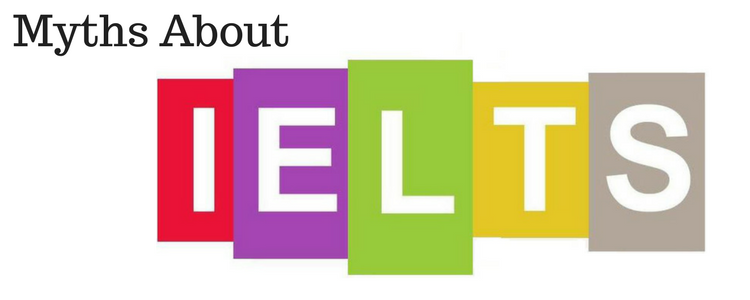Contact Us
Error: Contact form not found.
Top 10 Myths About IELTS Test
Tags: 10 Myths about IELTS., IELTS myths, Information about IETS., Misconceptions about IELTS., Things to know about IELTS, Top 10 Myths About IELTS Test, What are the Myths about IELTS test.Top 10 myths about the IELTS test – One of the magnetic tests of today’s era is IELTS (International English Language Test System). IELTS has a pivotal place with increasing emigration, many of the students head towards the IELTS test for distinctive purposes. With the raising of joinings in IELTS their many misconceptions about the IELTS test, which leads to disappointments. To clarify your vision we have brought the top 10 myths about the IELTS test. Scroll down to know.

Many of us study before joining any course, it’s scope, preparation, coaching, etc. So as for IELTS and its scope people gather knowledge by different means. But there are many myths regarding the IELTS test among people which makes them quit this test before any attempt.
To get aware of such myths is necessary to get the true vision about the IELTS test. So here we brought the top 10 myths about the IELTS test.
Top 10 Myths About IELTS Test
As you proceed for the IELTS test there is the number of suggestions, and reviews you get. Some may sound demoralizing. But these inappropriate views or suggestions are myths that make the students backstep from the IELTS test. Here below are the top 10 myths about the IELTS test.
1. IELTS is harder than other English Tests
The IELTS test is the standard of checking language aptitude accepted by thousands of employers, institutes, and companies across the globe. IELTS is not judged on difficulty bases as it does not need any cramming. It is based on concepts totally. The better your concepts, the lesser will be the difficulty.
- IELTS test requires conceptional knowledge.
- Practice the vocabulary regularly.
- It is easy once you understand all its concepts.
2. More words in a writing test mean more bands
There is a particular word limit in the IELTS test, for task 1 the word-limit is 150 words and for task 2 the word-limit is 250 words.
If a candidate would exceed the limit that would not affect the score. What matters is the correct grammar, enriched vocabulary, boggling expressions, these help in gaining the high score.
3. Scams offering IELTS information
Some irrelevant elements also construct the scam as the trend for the IELTS test is increasing and people take the advantages unethically.
Candidates must stay aware of such fraud people and do not share any personal information and only take information from verified and registered consultants.
4. Giving test in the home country might give better results
IELTS has the same level of test strategies all over the globe. So giving the test in the home town provides better results is a complete myth.
The examiners get the same level of high training and are closely monitored for consistent performance.
- Comfortability does not let the score rank high.
- Your comfort zone only helps you to establish your surroundings with positivity.
- All you need for high scores are practice and correct grammar.
5. It is easy to cheat in IELTS Test
This is the major myth that cheating in the IELTS test is easy. The IELTS test center is secured by a multilayered advanced protection system to make sure any sort of unfair commencement does not take place.
Apart from this if one is found using unfair means, he/she gets disqualified and the visa office is also informed sideways.
6. Practicing sample questions would help score the highest bands
Practicing from sample papers is a good way of practicing and these help you to understand the pattern of the test. But we consider this a myth that the sample papers make you score the highest score.
Ultimately the concepts, vocabulary, correct grammar, and good fluency make you score the highest score.
7. IELTS is too difficult
It is not justified to declare that IELTS is too difficult as it is only meant to evaluate your language skills. It only requires a good understanding of the concepts and of course practice which leads you to sore best in IELTS. So to consider the IELTS test difficult is a complete myth.
8. Smiling and laughing while speaking test can get you a good score
During the IELTS speaking test smiling and laughing would not increase your score at all. The only thing to care about is to keep nice gestures in front of examiners and stay confidant along with correct vocabulary, grammar, and good fluency.
- Oner needs to work on ethical gestures.
- Smiling or laughing does not make a difference if your vocabulary is not correct.
- Stay confident with correct speech.
9. If the opinions in writing and speaking test do not match to that of the examiner, you might lose marks
The opinions or your point of view upon the particular topic matching or not with the examiner does not matter at all in IELTS. The test is graded according to how well you have expressed your ideas in the correct language.
10. You lose marks if you do not speak in US or British accent
It is not mandatory to use the US or British accent to score high bands in the speaking tests. The evaluation of the speaking test depends upon how clearly you deliver your speech to the listen by using the correct grammar.
Conclusion
The aforementioned top 10 myths about the IELTS test will help you to understand how the IELTS test gets evaluated. There is a need to understand on what bases the IELTS test is designed and what are the correct ways to score highest bands leaving these myths behind as these are unethical and have no connection with scoring high bands in the IELTS test.









